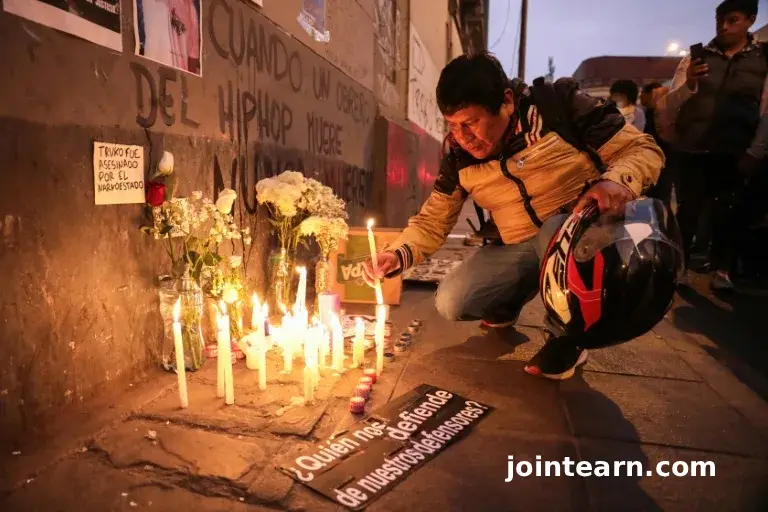
LIMA, PERU — The Peruvian government has announced plans to declare a state of emergency in the capital city of Lima following weeks of escalating anti-government protests, rampant crime, and deadly clashes between police and demonstrators.
The decision comes after a 32-year-old protester, rapper Eduardo Ruiz, was shot dead by police on Wednesday during a mass demonstration outside Peru’s Congress building, igniting public outrage and deepening the country’s growing political and social turmoil.
More than 100 people were injured in the latest round of protests, including 84 police officers and 29 civilians, according to Peru’s Ministry of Interior.
Government Moves to Restore Order After Weeks of Chaos
“We are going to announce the decision to declare a state of emergency at least in Metropolitan Lima,” Prime Minister Ernesto Alvarez told reporters Thursday evening after an emergency cabinet meeting.
The measure will temporarily suspend certain constitutional rights, expand police powers, and potentially deploy the military to support law enforcement in restoring public order.
The state of emergency is expected to cover the entire Metropolitan Lima region, home to nearly 11 million residents, and could later be extended to other regions facing similar unrest.
Death of Eduardo Ruiz Sparks National Outcry
The death of Eduardo Ruiz, a well-known musician and social activist, has become a rallying cry for the youth-led protest movement “Generation Z Peru,” which has mobilized thousands demanding an end to government corruption and gang-related violence.
Peru’s police chief, General Oscar Arriola, confirmed Thursday that a police officer from the criminal investigation directorate is believed to have fired the fatal bullet.
“The officer involved has been detained and will be dismissed from his position,” Arriola said, adding that internal investigations are ongoing.
Human rights groups, including the National Coordinator of Human Rights (CNDDHH), accused the police of using excessive force and claimed that Ruiz may have been shot by a plainclothes officer.
“The circumstances of his death were truly shameful,” said Solaris Raez, a 25-year-old university student who attended a vigil for Ruiz on Thursday night. “We are tired of seeing our people die for demanding justice.”
Protests Turn Violent as Police Clash with Demonstrators
What began as a peaceful march through downtown Lima quickly turned violent as night fell.
According to witnesses, a group of protesters attempted to breach security barriers around the Congress building, prompting police to respond with tear gas and rubber bullets.
In retaliation, some protesters threw stones, burned tires, and set off fireworks.
The clashes left streets littered with debris and filled with tear gas as ambulances rushed to treat the injured.
“We young people are tired of the violence, the corruption, tired of the daily death and extortion,” said Ariana Palomino, a 30-year-old shopkeeper from Lima’s northern district.
Political Instability Deepens After Boluarte’s Impeachment
Peru has been in political freefall since President Dina Boluarte was impeached last week over corruption allegations and her failure to address the worsening security crisis.
Her removal followed months of criticism over rising organized crime, extortion, and gang violence linked to groups such as Los Pulpos and Venezuela’s Tren de Aragua — criminal organizations accused of infiltrating cities and extorting local businesses.
Boluarte’s ousting marked another chapter in Peru’s long string of leadership crises — the country has had six presidents in the last five years.
Interim President Jose Jeri Seeks Emergency Powers
Following Boluarte’s removal, former Congress speaker Jose Jeri assumed the presidency, pledging to restore stability and confront organized crime.
On Thursday, Jeri asked lawmakers to grant him special powers to enact emergency security measures without parliamentary approval.
“The Peruvian people deserve safety, not fear,” Jeri said in a televised address. “We will not allow our cities to be held hostage by criminal organizations.”
However, critics and civil society groups warn that granting broad executive powers risks further eroding democratic checks and balances, especially in a nation already weary of corruption and authoritarian tendencies.
Crime Wave Fuels Public Anger
Peru is facing an unprecedented wave of violence, with reports of bus drivers, musicians, and local business owners being killed for refusing to pay protection money to criminal gangs.
The surge in violence has pushed citizens, particularly the youth, to take to the streets demanding urgent reforms.
“Every day, another person dies because the government does nothing,” said Carlos Mendoza, a 27-year-old taxi driver. “We can’t live in fear anymore.”
Public Mourning and Calls for Justice
On Thursday night, hundreds gathered for a vigil in downtown Lima, lighting candles and laying flowers at the site where Ruiz was killed.
The gathering remained mostly peaceful, with chants demanding justice for Eduardo Ruiz and the resignation of the interim government.
“Eduardo’s death must not be in vain,” one activist shouted as mourners sang songs written by the late rapper, known for his socially conscious lyrics about poverty and police brutality.
Peru’s Ongoing Political and Social Challenges
Peru’s recent turmoil underscores deep divisions between its ruling elite and a younger generation demanding transparency and reform.
The country has struggled to maintain political stability since the 2019 anti-corruption protests, which led to the downfall of multiple presidents.
With the declaration of a state of emergency, Peru now faces a delicate balancing act — restoring public order while avoiding further human rights violations.
Analysts warn that if heavy-handed tactics continue, the protests could escalate into a broader national crisis, threatening the fragile democracy of South America’s fifth-largest economy.
Outlook: A Nation on Edge
The coming weeks will test the ability of interim President Jeri’s government to restore trust and security in a nation weary of both political infighting and criminal violence.
As candles burned late into the night in Lima’s Plaza San Martín, one message echoed across banners and murals:
“Justice for Eduardo Ruiz. Peace for Peru.”


Leave a Reply